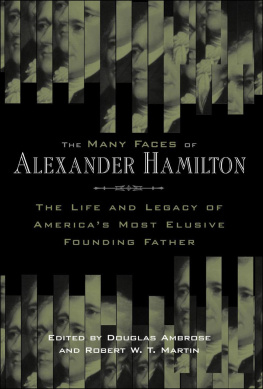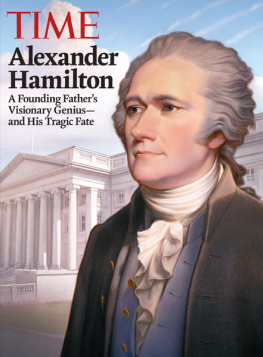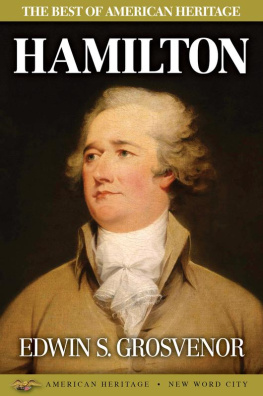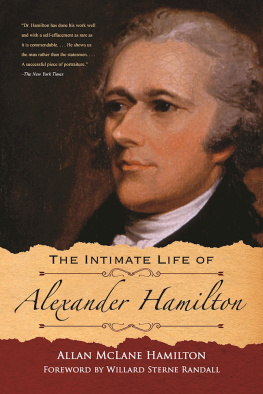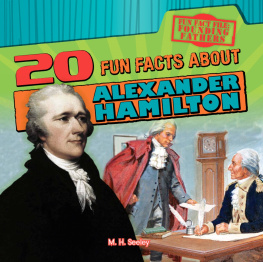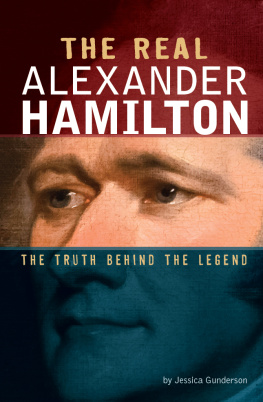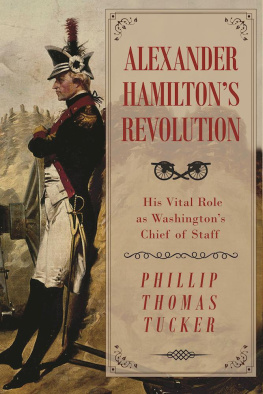This book is a publication of
Indiana University Press
Office of Scholarly Publishing
Herman B Wells Library 350
1320 East 10th Street
Bloomington, Indiana 47405 USA
iupress.org
2021 by A. K. Fielding
All rights reserved
No part of this book may be reproduced or utilized in any form or by any means, electronic or mechanical, including photocopying and recording, or by any information storage and retrieval system, without permission in writing from the publisher. The paper used in this publication meets the minimum requirements of the American National Standard for Information SciencesPermanence of Paper for Printed Library Materials, ANSI Z39.48-1992.
Manufactured in the United States of America
First printing 2021
Library of Congress Cataloging-in-Publication Data
Names: Fielding, A. K., author.
Title: Rough diamond : the life of Colonel William Stephen Hamilton, Alexander Hamiltons forgotten son / A. K. Fielding.
Other titles: Life of Colonel William Stephen Hamilton, Alexander Hamiltons forgotten son
Description: Bloomington, Indiana : Indiana University Press, [2021] | Includes bibliographical references and index.
Identifiers: LCCN 2020039194 (print) | LCCN 2020039195 (ebook) | ISBN 9780253053947 (hardback) | ISBN 9780253053954 (ebook)
Subjects: LCSH: Hamilton, William Stephen, 1797-1850. | Hamilton family. |
Northwest, OldHistory. | Frontier and pioneer lifeNorthwest, Old. | LawyersNorthwest, OldBiography.
Classification: LCC F484.3 .F54 2021 (print) | LCC F484.3 (ebook) | DDC 973.4092 [B]dc23
LC record available at https://lccn.loc.gov/2020039194
LC ebook record available at https://lccn.loc.gov/2020039195
Contents
Preface
Acknowledgments
1. Broken Beginnings
2. The Man
3. Life in Illinois
4. Black Hawk War
5. Gray Gold
6. Taming the Frontier
7. El Dorado
8. Dead End
Bibliography
Index
IN AMERICA, THE EARLY NINETEENTH CENTURY WAS A time of great upheaval. The election of Thomas Jefferson in 1800 gave the Jeffersonian Republicans a stronghold over the Federalists led by Alexander Hamilton, revealing a deep cleavage in the politics of the American people. The death of Hamilton in 1804, at the hands of Aaron Burr, sent the Federalists into a downward spiral from which they never recovered. The gaps between factions continued to widen as the century progressed, with the rise of the Democratic Party under Andrew Jackson and the Whig Party under the leadership of Henry Clay. From the age of Jackson to the end of the Mexican War, America continued to experience changes in its society, culture, economy, religion, and politics.
The effects of these changes were evident on the frontier as well. Following the War of 1812, the regions that later became the states of Illinois and Wisconsin experienced a shift in population as settlers arrived from New England, Missouri, Kentucky, and Tennessee. Before the war, fur trading supported the regions economy, but that changed with the growth of lead mining. New lead-mining operations, or diggings, appeared virtually overnight, making many of the settlers prosperous, even as many of the Native American tribes were dislodged from their ancestral lands. William Stephen Hamilton lived through this precarious period in the nations history.
The toughest part of being the child of a famous person is the pressure to fill the big shoes of the parent. A son of such a parent may be both famous and obscure. He may be recognizable because of his lineage but may be ignored otherwise. Such is the case with children of the Founding Fathers of America. Only one such man, John Quincy Adams, seems to have left an everlasting impression on the public mind. In contrast, others, such as William, have become lost to history.
William Stephen Hamilton was the sixth child of Alexander Hamilton and Elizabeth Schuyler Hamilton. If we compare Williams life to that of his illustrious father, he failed to achieve the same level of political success; yet if we consider that William lived in a period when new ideas were emerging in all areas of society, he becomes an exemplary representative of his time. Williams true worth, then, is measurable not as a celebrated politician but as an average man who, along with thousands of others, helped redefine what it meant to be an American.
It is difficult to place William in a particular social order. He was born to a famous New York family, but he chose to live in the wild frontier. His life took various turns and required him to change his future in unconventional ways. The loss of his father when William was seven shaped his youth, and the later estrangement from his family chiseled out a man who was intelligent, hardworking, industrious, and determined. It took physical courage, hardheaded realism, and dedication to settle a town on the frontier, employ misfits, deal with both friendly and hostile Native Americans, engage in politics, and prospect first for lead, then for gold. William accomplished all of these tasks and more, often without any support from anyone, and with gusto.
In studying the early Republic, historians have tried to illuminate the cultural, political, economic, and social issues prevalent during the period with some success. Joyce Applebys comprehensive study Inheriting the Revolution: The First Generation of Americans is based on material collected from two hundred autobiographies, and it credits the rise of American individualism to the second generation of Americans. Daniel Walker Howes extraordinary work What Hath God Wrought: The Transformation of America, 18151848 weaves together the intricate stories of average Americans and those belonging to the elite society during the early Republic. Gordon Woods Empire of Liberty: A History of the Early Republic, 17891815 focuses on the experiences of the upper class during this period. Yet most of the studies covering this period either focus on well-known Americans or make sweeping generalizations about the experiences of the pioneers.
This book examines events that took place on the frontier during the time of the early Republic through the lens of an obscure yet exceptional man, William Stephen Hamilton. Although the name Hamilton itself should have drawn respect and admiration, such was not always the case on the frontier. During the early Republic, the Jacksonians ruled the day in almost all of America. Williams own brothers were able to attain good positions in the government, working for the popular Jackson administration, but William, like many others, turned to the West to establish himself.
William has remained unknown to people because records about him are scarce. Moreover, historians have overlooked him because he was less famous than many of his contemporaries. Just one historian, Sylvan J. Muldoon, attempted to give a full-length biography of William: Alexander Hamiltons Pioneer Son: Life and Times of Colonel William Stephen Hamilton, published in 1930. Muldoons work left gaps in Williams story that required fresh research.
William was tight-lipped about his personal life. He left no known journal or diary. Before he left the Midwest for California, he seems to have left much of his personal belongings, including personal papers, with a neighbor in Wisconsin, but these items either have not survived or are yet to be located. Fortunately, some of his personal and business letters have survived and helped in patching together his life for this book. Contemporary documents including legal records, newspaper articles, journals, and letters are the bulk of primary sources for this study and offer some insight as to Williams appearance, business acumen, political stance, and character. Aside from such sources, the only way to truly find out more about William is to study his life through the period in which he lived.

![A. K. ]]> Rough Diamond: The Life of Colonel William Stephen Hamilton, Alexander Hamiltons Forgotten Son](/uploads/posts/book/377309/thumbs/a-k-rough-diamond-the-life-of-colonel.jpg)
